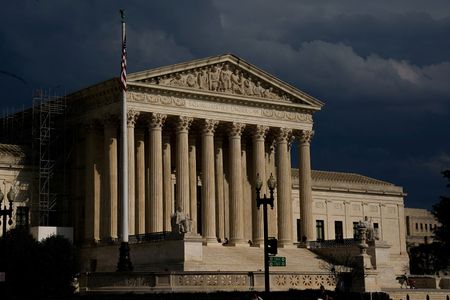 1
1 1
1
By Andrew Chung and John Kruzel
WASHINGTON (Reuters) -U.S. Supreme Court justices on Wednesday appeared sympathetic toward a 94-year-old woman in her battle with a Minnesota county government that sold her condominium to cover her unpaid taxes and kept the proceeds beyond the sum she owed in a case testing constitutional checks on excessive fines and property seizure.
The justices heard arguments in an appeal by Geraldine Tyler of a lower court’s ruling that threw out her proposed class action lawsuit accusing Hennepin County, which contains Minnesota’s most-populous city Minneapolis, of violating her rights under the U.S. Constitution.
It was the last scheduled argument for the current Supreme Court term, which began in October.
The dispute concerns Minnesota’s tax regime under which the state takes “absolute title” of a property if an owner fails to pay property taxes for five years. Under the regime, counties may keep any tax-delinquent property for a public purpose or sell it to other government entities or private buyers.
After covering expenses, any remaining proceeds are given to the local school district, city and county. None is refunded to the former owner.
Tyler accused the county of violating the Constitution’s Fifth Amendment bar on the uncompensated taking of private property by a government for public use and Eighth Amendment protection against excessive fines. She had owed the county $15,000, including roughly $2,300 in property taxes, as well as penalties, interests and costs.
Some justices pressed an attorney representing the county, Neal Katyal, after he agreed that the government could not seize the entirety of a $100,000 bank account to satisfy a $10,000 tax debt.
“To say that there’s a greater degree of protection for money as opposed to property, I think has it exactly backwards,” conservative Chief Justice John Roberts said.
In 2010, Tyler moved out of her one-bedroom condominium in Minneapolis and into an apartment building for elderly people. She then stopped paying taxes on the condo. The county said she refused other options to recoup the equity in her condo, including selling it, refinancing her mortgage or signing up for a 10-year tax payment plan.
The county foreclosed on her home and in 2016 sold it at auction for $40,000, which Tyler’s lawyers at the Pacific Legal Foundation conservative legal group called a “$25,000 windfall for the public” at her expense.
Tax-forfeiture laws like Minnesota’s are “especially pernicious for owners who have non-blameworthy reasons, including cognitive decline, physical or mental illness, or simple poverty,” her lawyers said in legal papers.
Tyler’s attorneys said in a court filing that 13 other states have similar policies that let government or private investors benefit when collecting delinquent property taxes.
The St. Louis-based 8th U.S. Circuit Court of Appeals last year upheld a judge’s dismissal of the case.
President Joe Biden’s administration backed Tyler’s claim that the county engaged in an unconstitutional taking.
Liberal Justice Sonia Sotomayor questioned the administration’s contention that a forfeited home’s value should be based on the amount it was worth when title transferred from the owner to the state.
“The state’s being forced into being the agent for the seller, and it’s going to have to take all the risk and all the responsibility for whatever happens to that property until it’s sold,” Sotomayor said. “Why would any state want to do that and why are you forcing states into that?”
A ruling is due by the end of June.
(Reporting by Andrew Chung and John Kruzel; Editing by Will Dunham)